How Glossier Sold Us Nothing
An interview with Marisa Meltzer, author of "Glossy: Ambition, Beauty, and the Inside Story of Emily Weiss’s Glossier."
Reading Glossy: Ambition, Beauty, and the Inside Story of Emily Weiss’s Glossier, a new book out today from author Marisa Meltzer, the same thought kept popping in my brain like so much pale pink bubble wrap: Glossier sold us nothing.
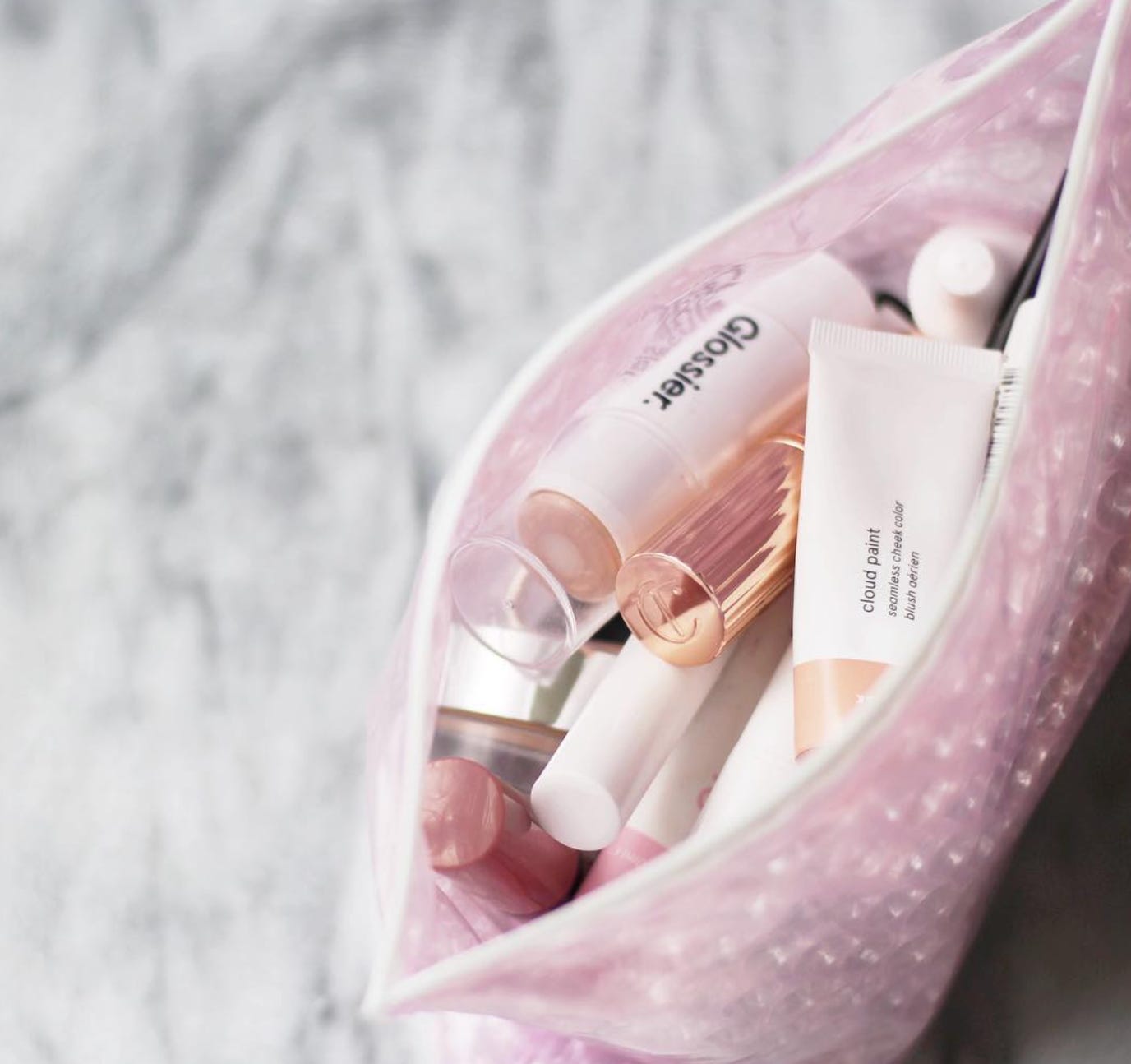
Maybe it isn’t a new thought. I wrote last year about how the nine-year-old startup rebranded makeup minimalism for the millennial masses with products like Perfecting Skin Tint (an “imperceptible wash of color,” Glossier boasts on its website) and Stretch Concealer (which “looks like skin”), eventually scaling to unicorn status — all thanks to nothing, or at least the look of it. But with insights into the industry at large and interviews from former Glossier employees as well as founder Emily Weiss herself, Glossy exposes the extent of that nothingness. It is deep, and vast; a black hole into which beauty investors and enthusiasts continue to throw billions.
Weiss launched Glossier in 2014. The entrepreneur had previously appeared on the reality show “The Hills” and worked as an assistant at Vogue before creating Into The Gloss — the online beauty platform that popularized the shelfie and, with all those artfully arranged acids and serums, made an aesthetic out of aesthetic labor. Into The Gloss was more than an editorial site though, Meltzer reports. It also functioned as free market research for a fledgling Glossier. By studying content performance and user comments, Weiss came to understand what consumers wanted from her new cosmetic company: products that, more than anything material, promised a sense of self. A personality. Identity. (It’s all there in the name: a faux-French play on the word “dossier,” or, as Meltzer defines it, “a collection of documents that, if reviewed, can tell you what you need to know to define that person.”)
“Glossier was the first beauty brand to function as a shorthand for the kind of person you wanted to be,” the author writes.
Who did the Glossier girl want to be? Herself, of course. Or rather, she wanted to appear to be herself; to seem authentic and effortless. She didn’t want to examine her attachment to production and consumption to do so, and she didn’t want to give up the cultural benefits of beauty, either. She wanted to purchase herself, please — but, like, a prettier version.
“Who are we? We are you,” Weiss wrote in a now-haunting (to me!) post introducing Glossier. “You, but better,” the product copy clarified. The line skewed heavily toward skincare, and positioned slathering one’s face in see-through cosmetics as more true-to-self than slathering one’s face color cosmetics. “Skin first. Makeup second,” the graphic design preached from inside a millennial pink box (before the shade was known as “millennial” pink, natch). The accompanying Instagram images featured gorgeous, glowing, no-makeup makeup models who were aspirational enough to move units, yet “imperfect” enough (freckles, gapped teeth) to make customers feel seen.
If this all sounds run-of-the-mill now, it is a testament to the revolutionary vision of Glossier. The startup reshaped the face of beauty branding.
Because the marketing was generation-defining, Glossier products — Smoothing Face Mist, Priming Moisturizer — got away with generic formulations. “Frankly, there’s not a great deal of difference on a chemical or ingredient level between many products, and many supposedly key or active ingredients have little scientific basis for their efficacy,” Meltzer writes. “We were selling Vaseline for $12 for half an ounce,” one former employee told her of the brand’s Balm Dotcom lip gloss. It didn’t matter. Glossier was a hit. It drew five million global customers, $265 million in venture capital, and a $1.2 billion valuation by July 2023.
RELATED:
Nearly a decade after its launch, the company is still selling the idea of you back to you (at an 80 percent profit margin). Its hero product, Boy Brow, markets the au naturel appeal of untouched brows in an $18 tube. Its fragrance, literally named You, promises to make you “smell mostly like you” for $65. And though Glossier may not have the cool-girl cachet it once had — Balm Dotcom was spotted at T.J. Maxx last year, and the corporation recently abandoned its direct-to-consumer sales model for the aisles of Sephora — its impact on the beauty space cannot be overstated. You is now the overt product offering of nearly every brand in the business, from Xeomin (“feel like yourself again”) to Scarlett Johansson’s The Outset (“The Start of You”) to skincare companies with names like Self-Made and Ourself and U Beauty. It’s working. Industry revenue is up. Weiss was right.
Is the Glossier founder some sort of manipulative marketing genius? Or is she simply her own core customer: a millennial too concerned with the aesthetic construction of the self to realize her methods are at odds with her message? Meltzer’s phrasing is a bit more generous than mine, but I think this is the question at the center of Glossy. The book is essential reading for anyone interested in the behind-the-scenes mechanics of the beauty business. It reads like a true crime thriller for industry obsessives, and I can’t recommend it enough.
Ahead, I chat with Meltzer about the company’s cult following, the power of a good product name, and whether or not the “Glossier girl” is over.
Jessica DeFino: Oh man, this book really took me back to the beginning of Glossier. When the brand launched, I was working on the Kardashian-Jenner Official Apps and writing about contouring everyday — the company even sent us to contouring classes. The Kylie Lip Kits were coming out, the vibe was heavy and cake-y, and then came Glossier. All the cool girls in the office were wearing it. Like, even as we were writing about full-coverage foundation and sculpting bronzer, we were buying Glossier, and it really felt like a defining industry moment. What do you think contributed to that shift — from very noticeable makeup being the thing, to invisible skincare being the thing?
Marisa Meltzer: I think it was a significant change, but I also think maybe it was kind of like, parallel ways of looking at makeup. Glossier was, when it launched, really about skincare. It really wasn't about makeup products for a while. It reminded me of people I know who worked at Condé Nast — the look for beauty editors was like, you didn't actually wear that much makeup because you put so much effort into having really good skin. You got facials. Beauty people always wore, you know, BB and CC creams, or some kind of tinted sunscreen. So that [Glossier] look was already popular with a certain class — the media fashion person. Glossier in some ways brought that look to the masses, but with this added message of, You don't actually have to look perfect. You can have freckles — in fact, you should.
JD: The other thing that really hit me while reading the book was that Emily Weiss was a reality TV star, and Glossier could have been categorized as a celebrity beauty brand — she was very early to it, obviously. But it just struck me that she was America’s reality star girlboss at almost the same time as Trump was our reality star president, and celebrity was really taking over American business and culture and politics in this pretty disturbing new way. Do you think Emily saw herself that way? And why do you think she was able to sidestep the celebrity association and be taken more seriously? Like, I’m thinking of her “Hills” costar Lauren Conrad and her beauty brand, which is obviously not taken that seriously.
MM: It is kind of ironic that everyone who was on “The Hills” and “Laguna Beach” all have beauty brands. Whitney Port, Lo Bosworth has a wellness brand, Lauren Conrad… They all took a very different path, but they ended up at the same place. I think part of [what makes Emily different] is like, it depends on your definition of stardom, right? Emily was only on three episodes of “The Hills” — I think it was three. She made a really strong impression on people who were watching, but she wasn’t the star. It was this curious thing where she might have seemed like she was famous in this micro way, but it's unclear to me exactly how famous she was. And so I think rather than see herself as a celebrity brand, I think she thought that she was more in conversation with influencers, or part of the editorial world. It makes sense. To this day people will be like, That girl from the hills founded Glossier??
JD: Totally, the editorial aspect makes sense when you consider that Glossier started with content — with the wildly popular Into The Gloss site. The book made it clear just how much Into The Gloss really, really transformed the beauty market. Like the Top Shelf feature, where Emily photographed the bathroom shelves of the industry elite — editors, models, makeup artists — and asked them to answer pretty intimate questions about the products they used. It exposed the expense and effort that went into beauty, and like… celebrated that expense and effort. It championed consumerism as a form of care, or art, or at least expression. What do you think are some of the main ways that ITG content helped beauty eclipse fashion in terms of growth, and in terms of being seen as this core tool of self-expression and adornment?
MM: Well, I think there was an intimacy to it that was so authentic. Now we're so used to that, like, “Get Ready With Me” thing — like Hailey Bieber's bathroom YouTube show. [Some of these videos now] have a crew and take thousands of dollars to produce — but ITG was literally Emily Weiss coming into your apartment, taking the photos, sitting down and talking about products with someone. I hate the word authenticity, but there was an authenticity that you really can't fake. And it felt really fresh and the photos were beautiful. And the bathrooms didn't look like they were out of some professional home tour. A lot of these apartments, even if the people had a lot of resources and money and power — you know, New York City bathrooms can often still be pretty small. And you would see the clutter and jumble that a lot of people had, which I think was very relatable. And then you started seeing these kind of tropes, that felt like an in-joke or something where it was like, Oh, you too use your burned-down Diptyque candle to store brushes. People really proudly displayed certain products. I feel like an early Into The Gloss favorite that they really championed was the Linda Rodin oil. It's so beautiful — it came in an art deco glass bottle that had a little bit of a Chanel No 5 feeling and it was very expensive, but it had the story of this beautiful gray-haired woman with a fabulous life making face oil out of her bathroom. It's all just really seductive. I also really think of products that were barely known, or only talked about by makeup artists or editors and skincare nerds, that then became this kind of lingua franca. Like Biologique, or any kind of like French girl beauty — there was that idea of going on vacation and buying them and bringing them back.
JD: And then there was obviously the shelfie! I mean, I am endlessly fascinated by the shelfie and how it like plays into our idea of our identity — how the beauty selfie was replaced by the beauty shelfie.
MM: Yes — the most beautiful, big, triple-row medicine cabinets.
JD: And part of the shelfie was like, people don't keep these products hidden in the bathroom cabinet anymore. They function as decor.
MM: Exactly, like the Rodin oil — you're going to show it off proudly because it connotes a certain amount of care and knowledge and investment. It was a big departure from the era of magazines, when an article would feature a fragrance the model was supposedly wearing, but the model was a brand ambassador. [Into The Gloss] wasn’t spon-con.
JD: Right? Well, but then I feel like Emily was using the content of Into The Gloss as a different type of “spon-con” — which was doing market research, you know, without paying for market research, to launch Glossier. She had this wealth of knowledge about what people were and weren’t responding to, so in a way, the ITG content funded Glossier. Another thing I couldn't stop thinking about after reading Glossy is how language supercharged Glossier’s growth. You wrote a lot about Annie Kreighbaum, who was the head of copy at Glossier. She taught employees not to say things like “Your luscious locks need some extra TLC” — the rule was, “If you wouldn’t say these words out loud, then don’t write them.” The result was this conversational, conspiratorial, playful, best-friend tone. Like, Glossier was the first beauty brand to promote a “Krispy Kreme straight-out-the-oven glazed look” and get a little silly with it. How big of a role do you think language played in Glossier’s success?
MM: I am a language person, so I think it was a big role. I think it's easy to point out the imagery and how they were really smart with that, or the millennial pink color. But I also think the language played a huge part because the products were sort of, you know, named in a way that was adorable and memorable but not twee. They were kind of nonsensical, but at the same time, you knew exactly what you were going to get out of it. Like when you say “Boy Brow” or “Cloud Paint” — someone who who has no idea about the brand can put the context clues together. That can't be underestimated. For example, I love Gucci Westman products and have plenty, but I can’t actually tell you the full names. Like her blush stick? No idea what it's called. Similarly, I bought a Dries Van Noten lipstick on vacation. I do not know the name of the color, I do not know what they're calling their lipstick. But I know what they're called at Glossier.
JD: It's so true. And it makes me think that it’s like, this holy communion of language and image that created the “cult of Glossier.”
MM: Some of the work that Amanda Montell has done around the way this language is wielded it is very powerful. It was a way to sell you and indoctrinate you and also make you feel like you're part of something.
JD: Exactly! I die over that quote in the book, where Emily says she thinks about scaling the company in terms of “how religions are scaled.” So I wanted to know, if Glossier is indeed a “cult,” what would you say are the main values of the cult of Glossier?
MM: The main values are being sort of like… breezy and upbeat. Then being fun, but not in a fake way — having sort of unselfconscious fun. Also like, a little bit of a sense of superiority. Not a big one, just a little bit of like, I know what this is. I'm part of it.
JD: What I would say is one of the more cult-y things about Glossier is its idea of community, and how the brand has really marketed itself as a friend rather than a corporation. And then there's sort of a darker side to that when you consider how Glossier has absorbed your actual friends into the corporation through its affiliate model and commission structure. I always found that strategy interesting, because the MLM-ish commission thing seems a little dated, especially with Glossier’s tech ambitions. How do you think the affiliate program has benefited the brand?
MM: You know, I don't think they tried that hard with it. Or at least, I think they realized that it was not really their route pretty quickly. I think the idea was basically like, Okay, we already have these mega-fans who are organically sharing codes with friends for a deal on ordering their first product, just because they are so excited about spreading the word. Can we make this formal? And I think — and this is just conjecture — that it was going to be some part of the app that they were always vaguely developing, without actually doing anything about it.
JD: You mention in Glossy that Emily was a little wary of the book being written because traditionally, a book about your company implies some sort of downfall or decline. After your research, do you think we are nearing the end of the Glossier girl?
MM: I don't think we're there yet. I think we need at least another year or two to see if the reboot they're doing is successful, or if we are nearing the end. The brand still does pretty well on TikTok, which makes me think, you know, the customers are pretty young. I also think that Sephora will bring Glossier to people who maybe have been waiting [to have access to it] or have never heard of it or something. It's unclear whether or not those people will become fans or followers. There is something very odd, to those of us who’ve followed the trajectory of Glossier, about it going into Sephora — into a sea of other brands, many of whom look like Glossier, partly because they’re borrowing from Glossier. It is disarming. They only debuted in Sephora about six months ago, so I would be interested in hearing any kind of earnings call numbers that were being released. But regardless, that initial chapter, that first act of Glossier, is certainly over. And whether that's the beginning of the end, I think remains to be seen. How do you feel about Glossier products? Do you think they're okay or do you think they're absolute garbage?
JD: I think the products are fine. I mean, I’ve used some of them myself. I am critical of the branding, you know, this like… conflation of identity and product consumption, and this sort relatable-to-a-selling-point marketing. Like, It's okay to have acne! But you really should cover it a little bit. But then again, there’s not really a brand that isn't preying on people like that.
This interview has been edited for length and clarity.

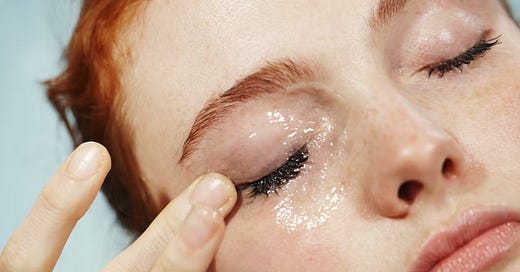


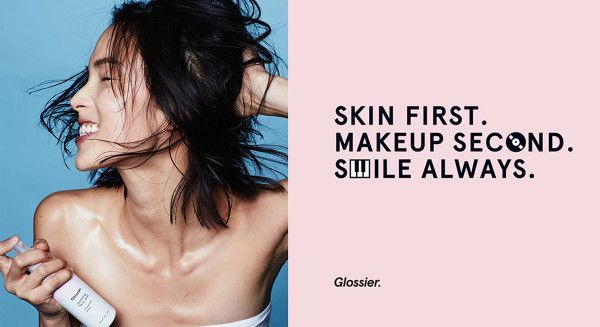

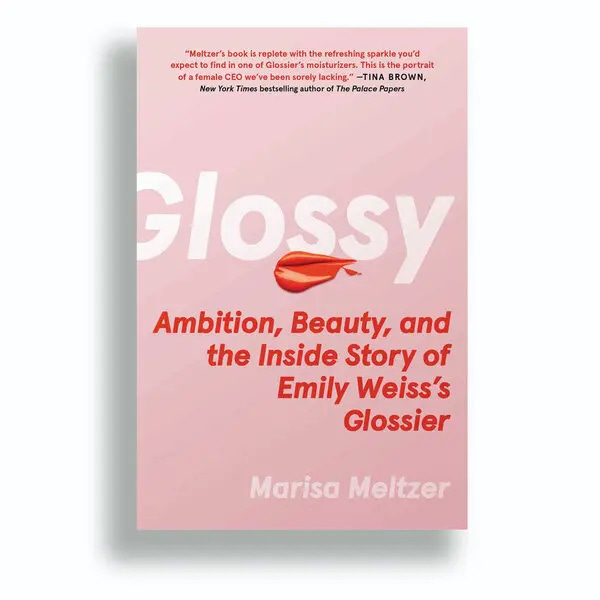
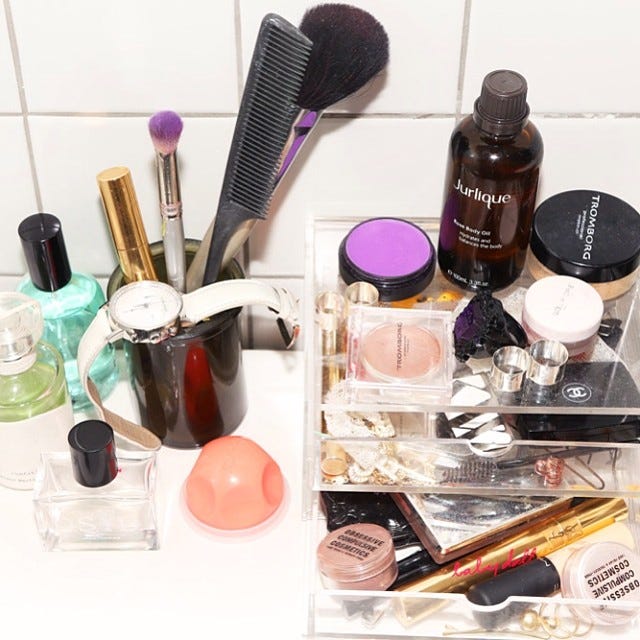
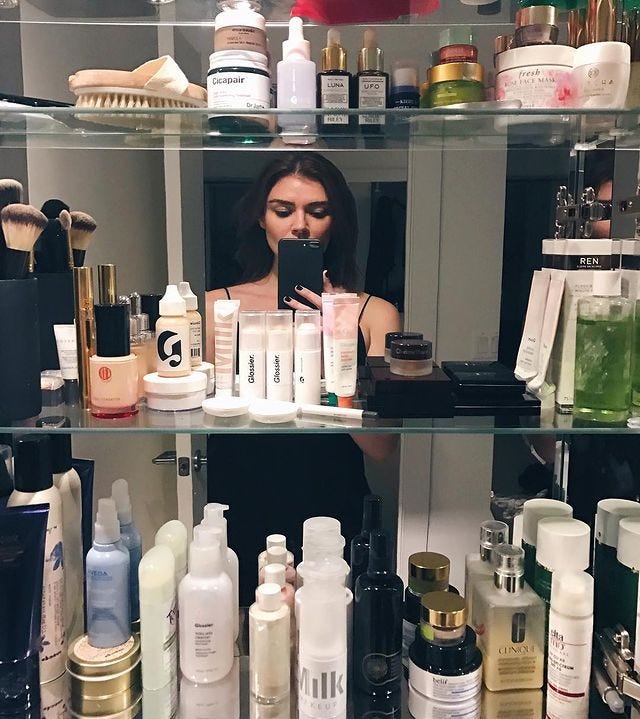
You, but better. The idea that you are competing with a version of you which exists out there already, ready to replace you and take all your opportunities for happiness as their own. And that maybe, if you buy the right products, and flawlessly perform 'being fun, but not in a fake way', you can defeat that doppelganger by becoming her ... Pretty much sums up the sisyphean anguish of being a woman.
Great interview that brought up so many thoughts and memories! The nothingness of it all is what I find so fascinating about Glossier and about my own relationship with beauty. I was a tom boy/ "cool girl" all through high school and college. I was able to skirt by on perfect skin (ah how I miss youth and being able to take birth control pills without debilitating migraines) and a bit of mascara. I then hit the corporate world where performing beauty was a form of "professionalism" I felt I needed. Glossier arrived at the perfect moment (2 years into my working life). I felt like I could put on "skin tint" or brush my brows and suddenly I had put in the effort of a "working woman" while still feeling like myself. It gave me a twisted and comforting feeling that I had checked the boxes of adult womanhood while also conveniently escaping the trap of superficial vanity. It's GENIUS marketing because as you mention, the products are shit. But when you don't want products at all and only are using them for emotional reasons, shit is fine. When I think back to my early working days, I had such an extreme need to fit in. Seeing a tube of Balm Dot Com on a smart savvy co-worker's desk was comforting and reassuring in an actually meaningful way. And I work in a male dominated industry so girly bonding was desperately needed. In some ways, I feel like being sold nothing but the cult-y side of beauty (feeling of belonging, superiority, "knowledge") was actually better for me than being sold a product that actually worked? Much to consider. And thank God for personal growth and your work so I look back on my silly thoughts with some new perspective!